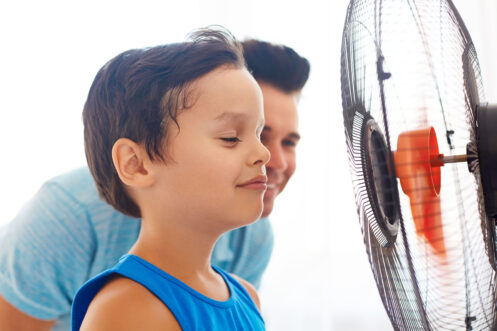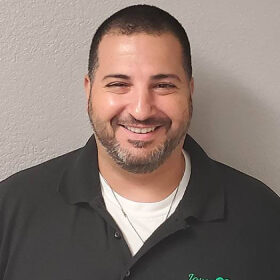When your air conditioner stops working right in the middle of summer, don’t panic, but pay attention to the symptoms. Maybe your AC is blowing warm air or it’s making an unusual sound. Before you assume the worst, you can check a few things yourself. Knowing what to look for can save you time, stress, and sometimes even a service call. Loves Air in Modesto, CA helps homeowners make sense of AC problems so they can get back to feeling comfortable faster.
Start With the Thermostat
When something feels off, the thermostat is the easiest place to start. Maybe the air feels warm or your AC isn’t blowing anything at all, but that doesn’t always mean the unit is broken. Sometimes the thermostat setting gets bumped, or the batteries run low and stop sending signals. You’ll want to check if it’s set to “cool” and not “fan” or “heat,” especially if someone else used it last.
If the screen is blank, try replacing the batteries or checking the circuit that powers it. Even smart thermostats glitch sometimes, and a quick reset might get things back to normal. If your system kicks on after you double-check the thermostat, the problem may not have been the air conditioner at all.
Double-Check the Breaker Box
When your air conditioner doesn’t start, you might assume something big went wrong. But sometimes, the problem lives in the breaker box. A tripped breaker can quietly stop the whole system without warning. Find the labeled circuit and see if it’s sitting in the middle or off position. Flip it fully off and then back on. That step might restore power right away. If it trips again soon after, you’re likely dealing with something electrical inside the system.
That’s not something to push through. Repeated trips can signal a short, an overheating motor, or a compressor issue that needs professional attention. Either way, a flipped breaker is easy to miss but worth checking before you dig any deeper.
Check the Filter
When the air feels weak and the room takes forever to cool, the problem might start at the filter. A clogged or dirty filter restricts how much air moves through the system. That slows down cooling and puts pressure on other parts of the unit. If you hold your hand near a vent and barely feel airflow, look at the filter first.
A filter covered in dust, pet hair, or debris should be replaced immediately. Filters that get too dirty can also cause the evaporator coil to freeze. That starts a chain reaction that affects performance and temperature control. A new filter costs a few dollars and can prevent bigger problems if you stay ahead of it.
Listen for Unusual Noises
Most air conditioners make a steady hum or a soft whoosh when the blower kicks in. When that sound changes to banging, rattling, or high-pitched squealing, something’s off. Loose parts, debris in the fan, or a belt that’s starting to wear can all cause strange noises. You might also hear clicking if the relay or capacitor is failing to start the compressor.
These small sounds can get worse quickly if you ignore them. A rattle today could turn into a broken fan blade tomorrow. If the sound feels new or loud, it’s worth turning the system off until someone can take a closer look. The earlier you catch mechanical noise, the less likely it is that you’ll deal with bigger repairs.
Watch for Ice on the Outdoor Unit
Even during hot weather, your AC system can freeze. If you see ice building up on the copper lines outside or around the outdoor unit, something isn’t right. When the refrigerant isn’t circulating properly or the coil gets too cold and starts to collect condensation, the line freezes. Sometimes, this starts with low refrigerant. Other times, poor airflow from a clogged filter or blocked return vent causes the problem.
Don’t Ignore Water Around the System
You might spot a puddle near the indoor unit or a wet patch on the floor without knowing the source. In many cases, the water is coming from the condensate drain. When warm air hits the evaporator coil, moisture collects and drains through a small pipe. If that pipe clogs or the pump fails, the water has nowhere to go and starts spilling out. That leak might look small at first, but it can damage flooring, drywall, or ceiling tiles, depending on where the unit sits.
Some systems shut off automatically if the drain backs up, leaving you without cooling until the problem gets cleared. If your system keeps stopping without a clear reason, a clogged drain line could be involved.
Warm Air Might Mean Low Refrigerant
When the air from your vents feels room temperature or slightly warm, check whether the AC is running nonstop without making a difference. If that’s happening, low refrigerant could be the reason. Air conditioners rely on refrigerant to move heat from inside your home to the outside coil. If there’s a leak, the refrigerant level drops, and the system stops removing heat effectively.
Unlike fuel or oil, refrigerant doesn’t get “used up,” so if it’s low, there’s a leak somewhere. You won’t be able to fix that yourself, but noticing it early makes a difference. Watch for icy coils, constant running, and lukewarm air.
Short Cycling Signals a Deeper Issue
If your AC turns on for a minute or two and shuts back off, then repeats that cycle constantly, that’s called short cycling. It usually means something is interrupting the cooling cycle. That could be an oversized unit, a clogged filter, a frozen coil, or a failing thermostat. Short cycling uses more electricity and wears out parts faster because the system keeps starting and stopping without reaching a full cooling cycle.
If you’re hearing it click off too quickly, or noticing that it runs in strange patterns, it’s worth digging deeper. The cause might be small, like a dirty sensor, or more complex, like a wiring problem or a failing control board.
Unusual Odors Could Point to Mold or Electrical Issues
If your AC kicks on and you smell something burnt or musty, don’t brush it off. A burning smell might mean the motor is overheating or wiring is damaged. A musty odor, on the other hand, often comes from mold or bacteria inside the system. That’s more likely if the coil has stayed damp or the drain pan isn’t emptying properly. The smell might get stronger near the vents or only show up during certain parts of the cooling cycle. Either way, the odor gives you clues. Pay attention to when it starts, how strong it is, and whether it fades when the system shuts off. All of that helps narrow down the source.
Schedule an AC Tune-Up Today
AC issues often begin with subtle signs, such as low airflow, a clogged filter, or the wrong setting. If your system still won’t cool properly after basic checks, it’s time to call in a pro. In addition to AC repair, Loves Air also offers seasonal maintenance, indoor air quality solutions, and system upgrades that can keep your whole house comfortable. Schedule your AC tune-up with Loves Air today and stay ahead of the heat.



